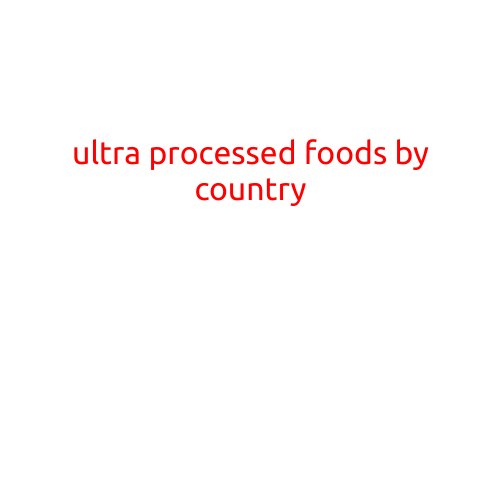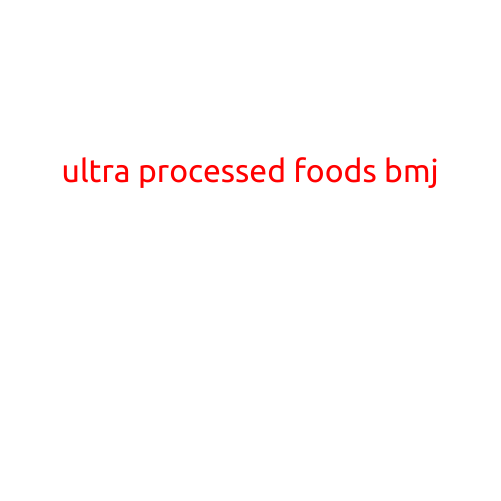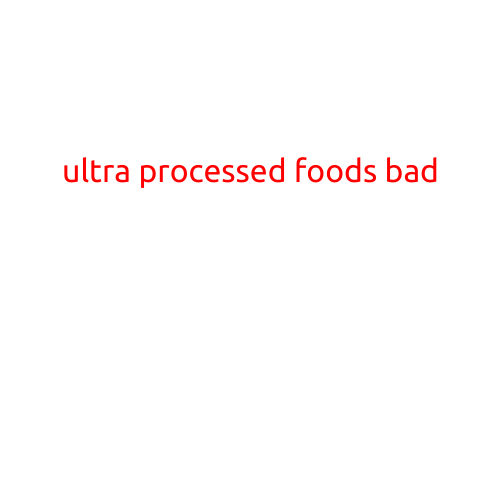
Ultra-Processed Foods: A Recipe for Disaster in Your Diet
In today’s fast-paced world, convenience has become a top priority for many of us. This has led to an increase in the consumption of ultra-processed foods, which are making a significant impact on our health. These foods are designed to be quick and easy to prepare, but at what cost?
What are Ultra-Processed Foods?
Ultra-processed foods are products that have undergone significant physiological changes through the addition of various ingredients, such as sugar, salt, and unhealthy fats. They are often packaged and contain a multitude of chemical additives, including preservatives, coloring agents, and flavor enhancers.
Examples of ultra-processed foods include:
- Packaged snacks, such as chips, crackers, and cookies
- Frozen meals, such as pizza, mac and cheese, and TV dinners
- Canned goods, like soups, sauces, and meats
- Breaded and frozen foods, like chicken nuggets and fries
- Energy bars and sweetened beverages
The Dangers of Ultra-Processed Foods
Consuming ultra-processed foods regularly has been linked to numerous negative health effects, including:
- Increased Risk of Chronic Diseases: Consuming high amounts of ultra-processed foods has been associated with an increased risk of chronic diseases, such as:
- Heart disease and stroke
- Type 2 diabetes
- Obesity
- Certain types of cancer
- Negative Impact on Gut Health: Ultra-processed foods can alter the gut microbiome, leading to changes in the way our bodies process nutrients and increasing the risk of diseases.
- Nutrient Deficiencies: These foods are often stripped of essential nutrients, leading to deficiencies and an increased risk of health problems.
- Addictive Properties: Ultra-processed foods can activate the brain’s reward centers, making them highly addictive and leading to overconsumption.
- Environmental Impact: The production and disposal of these foods have a significant environmental impact, contributing to climate change, pollution, and waste management issues.
The Benefits of Whole Foods
In contrast to ultra-processed foods, whole foods are nutrient-dense, unprocessed, and minimally processed. Examples of whole foods include:
- Fresh fruits and vegetables
- Whole grains, like brown rice and quinoa
- Lean proteins, such as chicken and fish
- Healthy fats, like avocado and olive oil
- Nuts and seeds
The benefits of whole foods include:
- A reduced risk of chronic diseases
- A balanced gut microbiome
- Nutrient deficiencies
- Reduced addictive properties
- A reduced environmental impact
Making the Switch to Whole Foods
To reduce your consumption of ultra-processed foods, consider the following tips:
- Read Labels: When shopping, read food labels carefully and choose products with fewer ingredients and less processing.
- Cook from Scratch: Cooking meals from scratch using whole foods can be time-consuming, but it allows for greater control over the ingredients and nutritional content.
- Plan Ahead: Meal planning and preparation can help reduce the temptation to grab ultra-processed foods.
- Avoid Convenience: Try to avoid relying on convenience foods and opt for whole foods instead.
Conclusion
Ultra-processed foods are a recipe for disaster in your diet. By choosing whole foods and reducing your consumption of ultra-processed foods, you can significantly improve your health and reduce your environmental impact. Make the switch today and reap the benefits of a nutrient-dense diet.





